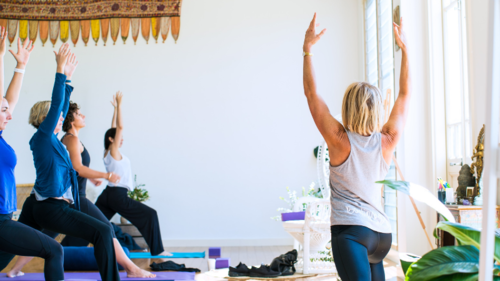Mindfulness for Marketers
As we see an increase in the level at which professionals engage with technology for marketing purposes, we also see a rise in related consequences such as disturbed sleep, less focus at work, increased anxiety and difficulty in relaxing the nervous system. This is especially noticeable in those who aren’t tending to their body and mind.
Mindfulness is about having a sharper brain, being able to remember people’s names, being less reactive, and making sure you are experiencing life’s pleasures. Because you matter.
3 top tips for Mindfulness
1. Just breathe.
Ever feel out of control? When we get so engrossed in our to-do-lists and deadlines, we lose track of the flow of our life. The way we breathe is strongly linked to the way we feel. When we are relaxed we breathe slowly, when we are stressed, we breathe more quickly. In order for your body to run efficiently, there needs to be a balance of oxygen and carbon dioxide. Do you know how to maintain this? Yes, you guessed it - how deeply we breathe.
Here is a simple breathing practice for improved well-being.
1) Find a comfortable spot – a car or on your bed is fine – sitting, standing, or lying down, with eyes gently closed or a soft gaze in front of you.
2) Take a deep breath in for 4 seconds (through the nose if possible).
3) Hold the breath for 7 seconds
4) Release the breath for 8 seconds (through the mouth if possible) then pause
5) You can say to yourself, I am calm and I relaxed.
6) Repeat for 90 seconds

2. Meditation.
When we give ourselves time to meditate, we give ourselves the opportunity to experience the real benefits mindfulness has to offer, calmer, more focus, better wellbeing and less burnout.
“It’s like having a charger for your whole body and mind. That’s what meditation is.” – Jerry Seinfeld.
If you want to decrease anxiety, meditation can help. This is backed by sound clinical research that shows after 8 weeks of meditating 20 minutes per day, the amygdala (the area in the brain responsible for stress and anxiety) decreases in size. You will notice you are less anxious, reactive and stressed.
Explore a 10 minute guided meditation here:
10 minute guided Meditation for Calming Anxiety
3. Mindful Eating
‘When walking, walk. When eating, eat.’ - Zen proverb
Mindfulness operates on two levels. First, is the meditation, the second involves returning back to basics. Every day more information comes into our lives, more stimulus, more social media and more stuff on our minds. When you reach the point where such overload has taken over the conscious mind, it’s really hard to think your way out of it.
Mindfulness involves taming your autopilot, so you live more in the present moment. We need to learn to close down some of the ‘programs’ that continually run in the back of your mind.
The first place to do this involves returning back to basics. For this reason, one of my favourite activities is mindful eating.
The good news is this skill will gradually show you how to settle your mind and get back on track – in order to live a more mindful life.
Chocolate Mindful activity
1. Physical touch
Take one piece of chocolate and hold in the palm of your hand. What is the weight like? Is it heavy or light?
2. Seeing
Take the time to really look at the chocolate. Does it have any grooves or ridges? Are there any bits of nuts or candy sticking out? Turn it over in between your finger and thumb. What does it look like on the other side?
3. Smelling
Holding it beneath your nose, what do you notice as you breathe in? Does it have a smell? Are there any other flavours you can smell in the chocolate?
4. Tasting
Put the chocolate on your tongue, and gently close your mouth. What does the chocolate taste like? Explore the sensations with your tongue. What is your mouth doing? Is it producing a lot of saliva?
5. Chewing
When you are ready, take a bite into the chocolate and notice the burst of flavours. Notice any taste that releases. Continue slowly chewing it. What is your tongue doing? Is it cleaning your teeth? Exploring the roof of your mouth?
6. Swallowing
Notice the first urgency to swallow the warm chocolate milk. See if you can visualise the warm milk going down the back of your throat, down your oesophagus, into your stomach. Consciously notice a second or third swallow. Notice what the tongue does after you have finished swallowing. Is it cleaning your teeth again?
7. Afterthoughts
Spend a few moments noticing what your mind is doing. Is there an aftertaste? Have you ever experienced eating chocolate like this before?
How often whilst watching a movie have we eaten chocolate and the entire packet has vanished before we even remember tasting one?
Did you notice your experience of eating the chocolate was transformed by the simple act of focusing on it? Many people say “They have never tasted chocolate like that before.”
Mindfulness teaches us to be fully aware. To experience the senses of seeing, hearing, tasting, smelling and touching which too often goes drifting by you unnoticed.
Take a moment, close your eyes…..imagine a life free from stress, free from burnout, free from being busy and free from the burden of too much on your plate.
That’s your life, ready for you by embracing a more mindful life.

Who is Chelsea
Chelsea Pottenger, Director of EQ Consulting Co, is a PhD student of clinical psychology and neuroscience, Internationally Accredited Mindfulness and Meditation practitioner and the Ambassador for R u OK? and The Gidget Foundation. Chelsea works with TOP ASX companies including Westpac, uBer, eBay and Johnson and Johnson. With a social media following @eqminds of 100k people, Chelsea’s passion for the rest of her life is saving people from suicide. Please follow her on Instagram for mental health tips.
Retreat
Being an aligned partner of iknowho, we gift professionals a special price for our luxury retreat on the South Coast, NSW. We are booked out in 2018, however, we are now taking bookings for 2019 if you would like to recharge in a luxury Hampton's style house.
The cost is $1300, however with the discount code below you can attend the retreat for $550 (excluding accommodation)!
Use the code: SPECIALGIFT on our website










